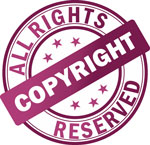Rights & Royalties

Copyright law protects authors' basic rights over their work: the rights to perform or display it publicly, to reproduce and distribute it, produce other works based on it, to claim its authorship, and to make sure its integrity is not compromised.
A work is copyrighted by the act of writing it, and is announced publicly by the act of publishing the text. A copyrighted play can then become a rentable property, and like anything that can be rented, there are rules.
How It Works
Consider this analogy: An apartment owner establishes certain conditions or restrictions under which his property may be rented. You, as a prospective tenant, can choose to accept or refuse those terms. If you refuse, you look somewhere else. If you accept the terms, you must follow the owner's written rules, as long as they are legal. And you can't live in the apartment without paying the rent.
It seems odd that while most folks understand the concept of renting an apartment, the concept of renting a play seems difficult for many people. Another way of looking at it: Royalty is the author's income, the rental they receive for the use of their property. A licensing company pays its authors a royalty on each script sold and a substantial percentage of the performance royalty it collects.
The basics:
- In the case of plays, the copyright information is clearly stated in the printed text, usually on the back of the title page. More detailed information is included in the licensing contract, but the basics are printed on the copyright page.
- A license to present a show normally contains general rules, as well as specifics such as the dates for which performance rights are granted, the theater location, the number of seats and the price of tickets.
- The license is specific in its wording and does not imply any authorization to move the production to another theater, to extend the run, change prices, or to modify the play in any way.
- If you produce a play protected under copyright, and do not receive permission from the playwright or publisher/agent, you are essentially stealing someone's property, and can be sued.
- Royalty payments are the normal method of securing production rights to a copyrighted play.
- For more detailed information, visit our "Obtaining Rights" page
Copyright Law in Brief
- The copyright law grants the copyright owners (authors and other creators) the sole right to (or allow others to) reproduce all or part of the work, distribute copies, prepare new versions based on the original work, and to perform and display the work publicly.
- The creators/authors of most plays and musicals that are protected by copyright are represented by licensing companies, such as Music Theatre International, Concord Theatricals, Theatre Rights Worldwide (TRW). [See our Play Sources page]. So while you may make payments to the licensing company, you're really paying the authors for their work.
- You'll normally find copyright information on the reverse side of the title page of a book or play. Typical wording: "Copying from this book in whole or in part is strictly forbidden by law," or "No part of this work may be reproduced or transmitted in any form or by any means, electronic or mechanical, including photocopy...without permission in writing from the publisher."
- Copyright protection covers both published and unpublished works. The fact that a previously published work is out of print does not affect its copyright. The best method for determining copyright ownership is by contacting the publisher of the work that you wish to copy.
- Civil and criminal penalties may be imposed for copyright infringement. Civil remedies include an award of monetary damages, an award of attorney's fees, injunctive relief against future infringement and the impounding and destruction of infringing copies.
More Help
- For detailed help and guidance, visit our "Obtaining Rights" page
- For a complete explanation of copyright law, see the Library of Congress website under "Copyright Basics" [www.copyright.gov].
- AACT's Glossary of Rights & Royalty Terms (PDF)
- Working with Publishers & Royalty Houses (PDF)
- Dramatists Guild: Copyright 101
- Don't Change The Words: You may have licensed the play or musical, but it's not yours to change {Dramatists Guild]
- Copyright Crash Course [University of Texas at Austin website]
- The Use of Copyrighted Materials in Live Theatre Productions [MS Word document] [Richmond Sound Design website]